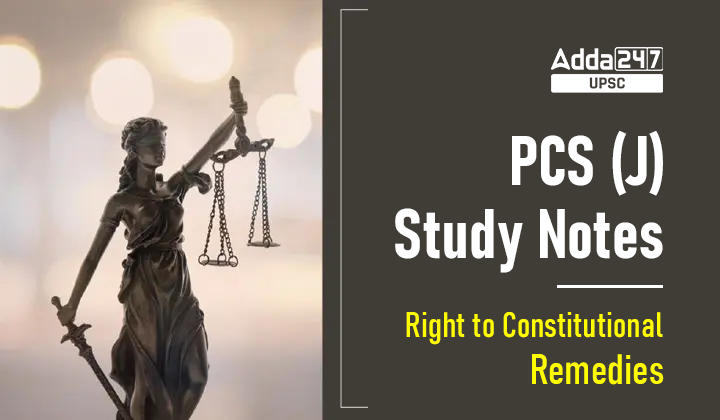Table of Contents
Right to Constitutional Remedies
In India, everyone has the legal right to file a petition in the Supreme Court for protection of their basic rights. Article 32 of the Constitution guarantees access to the Supreme Court for this purpose, while Article 226 of the Constitution guarantees access to the High Court for this purpose. It’s formally known as “remedies” under the Constitution. This provision grants Supreme and High courts the authority to enforce the Fundamental Rights. In addition, local courts have the authority to issue the power necessary to expand the rights. However, the court-martial procedure is an exception to this rule because it falls under military law.
This privilege describes the five distinct writs that the courts in India have the authority to issue under Articles 32 and 226 of the Indian Constitution. Both the High Courts (Article 226) and the Supreme Court (Article 32) have the authority to hear certain cases. Article 32 itself is a fundamental right since it ensures a guaranteed, summary, and speedy remedy for enforcement of the right. In this case, the individual has the ability to bypass lower courts and proceed directly to the Supreme Court. The Supreme Court has original jurisdiction but is not exclusive; it runs concurrently with the High Court in cases involving the enforcement of fundamental rights (Article 226).
When a person’s constitutional rights have been violated, they can submit a writ petition in court to seek redress from the state. The following are the five categories of writs:
Habeas Corpus: It is a Latin term which means ‘you have the body. It’s a court order to bring someone who’s been held illegally into court.
Mandamus: It is a Latin term which means ‘we command’. It is given to force a government agency to carry on its legal responsibilities.
Quo Warranto: It is a Latin term which means ‘by what authority.’ It is provided to determine whether or not a person is eligible to hold public office.
Certiorari: It is a Latin term which means ‘to be certified’. It is used to overturn decisions made by lower courts or tribunals that have overstepped their authority.
Prohibition: It is a Latin term which means ‘to forbid’. It is issued when a lower court or tribunal tries to do something outside of its authority.
संवैधानिक उपचारों का अधिकार
भारत में, सभी को अपने मूल अधिकारों की सुरक्षा के लिए सर्वोच्च न्यायालय में याचिका दायर करने का कानूनी अधिकार है। संविधान का अनुच्छेद 32 इस उद्देश्य के लिए सर्वोच्च न्यायालय तक पहुंच की गारंटी देता है, जबकि संविधान का अनुच्छेद 226 इस उद्देश्य के लिए उच्च न्यायालय तक पहुंच की गारंटी देता है। इसे औपचारिक रूप से संविधान के तहत “उपचार” के रूप में जाना जाता है। यह प्रावधान सर्वोच्च और उच्च न्यायालयों को मौलिक अधिकारों को लागू करने का अधिकार देता है। इसके अलावा, स्थानीय अदालतों के पास अधिकारों का विस्तार करने के लिए आवश्यक शक्ति जारी करने का अधिकार है। हालाँकि, कोर्ट-मार्शल प्रक्रिया इस नियम का अपवाद है क्योंकि यह सैन्य कानून के अंतर्गत आता है।
यह विशेषाधिकार उन पांच अलग-अलग रिटों का वर्णन करता है जिन्हें भारत में अदालतों को भारतीय संविधान के अनुच्छेद 32 और 226 के तहत जारी करने का अधिकार है। उच्च न्यायालयों (अनुच्छेद 226) और उच्चतम न्यायालय (अनुच्छेद 32) दोनों के पास कुछ मामलों की सुनवाई करने का अधिकार है। अनुच्छेद 32 अपने आप में एक मौलिक अधिकार है क्योंकि यह अधिकार के प्रवर्तन के लिए एक गारंटीकृत, संक्षिप्त और त्वरित उपाय सुनिश्चित करता है। इस मामले में, व्यक्ति के पास निचली अदालतों को बायपास करने और सीधे सुप्रीम कोर्ट जाने की क्षमता है। सुप्रीम कोर्ट का मूल अधिकार क्षेत्र है लेकिन यह अनन्य नहीं है; यह मौलिक अधिकारों के प्रवर्तन से जुड़े मामलों में उच्च न्यायालय के साथ-साथ चलता है (अनुच्छेद 226)।
ब किसी व्यक्ति के संवैधानिक अधिकारों का उल्लंघन किया गया है, तो वे राज्य से निवारण के लिए अदालत में एक रिट याचिका प्रस्तुत कर सकते हैं। रिट की पांच श्रेणियां निम्नलिखित हैं:
बंदी प्रत्यक्षीकरण: यह एक लैटिन शब्द है जिसका अर्थ है ‘आपके पास शरीर है। यह किसी ऐसे व्यक्ति को न्यायालय में लाने का न्यायालय का आदेश है जिसे अवैध रूप से न्यायालय में रखा गया है।
मैंडमस: यह एक लैटिन शब्द है जिसका अर्थ है ‘हम आज्ञा देते हैं’। यह एक सरकारी एजेंसी को अपनी कानूनी जिम्मेदारियों को निभाने के लिए मजबूर करने के लिए दिया जाता है।
क्यू वारंट: यह एक लैटिन शब्द है जिसका अर्थ है ‘किस प्राधिकरण द्वारा’। यह निर्धारित करने के लिए प्रदान किया जाता है कि कोई व्यक्ति सार्वजनिक पद धारण करने के योग्य है या नहीं।
सर्टिओरिअरी: यह एक लैटिन शब्द है जिसका अर्थ है ‘प्रमाणित होना’। इसका उपयोग निचली अदालतों या न्यायाधिकरणों द्वारा किए गए फैसलों को पलटने के लिए किया जाता है, जिन्होंने अपने अधिकार को खत्म कर दिया है।
निषेध: यह एक लैटिन शब्द है जिसका अर्थ है ‘निषिद्ध करना’। यह तब जारी किया जाता है जब कोई निचली अदालत या न्यायाधिकरण अपने अधिकार के बाहर कुछ करने की कोशिश करता है।


 UPSC Prelims Exam Date 2024, Check New E...
UPSC Prelims Exam Date 2024, Check New E...
 UPSC Eligibility Criteria 2024- Age Limi...
UPSC Eligibility Criteria 2024- Age Limi...
 UKPSC RO ARO Result 2024 Out, Download M...
UKPSC RO ARO Result 2024 Out, Download M...







